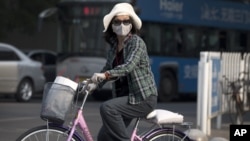BEIJING —
Pollution in China's vast countryside worsened further in 2012 as a result of the encroachment of industry and mining on farmland and an expansion of animal husbandry, the environment ministry said on Tuesday.
Pollution has emerged as one of the biggest challenges facing China's ruling Communist Party and its newly appointed leaders, with the government acknowledging that poor air and water quality has become a major causes of unrest.
The government is expected to unveil tough new measures to curb industrial emissions within the month, but the countryside could be an even harder challenge, with experts saying China's farms are now an even bigger source of pollution than the cities.
“With industrialisation, urbanization and the modernization of agriculture, the situation for the rural environment has become grim,'' the Ministry of Environmental Protection said in its annual report for last year.
“The stand out points are an increase in pressure from mining pollution... and severe pollution from the raising of livestock and poultry.''
In its annual report, the Ministry of Environmental Protection said China continued to face grave pollution problems despite overall improvements in air and water quality in 2012.
It described 2012 as a significant turning point after China's newly-appointed leadership vowed to build a “beautiful China'' and address the consequences of three decades of untrammeled growth.
But it noted that while overall environmental conditions did not worsen in 2012, “trends remained extremely serious."
Air quality in cities remained “generally stable'' in 2012, with emissions of sulfur dioxide - a pollutant caused mainly by coal burning - falling 4.52 percent to 21.18 million tons.
The ministry did not provide data for PM2.5, or airborne particulate matter with a diameter of less than 2.5 micrometers, a major health hazard caused by industrial coal burning and vehicle emissions.
In January, PM2.5 levels in large parts of northern China, including the capital Beijing, triggered widespread public anger and forced the authorities to introduce emergency measures to thin traffic and shut down polluting industries.
Wan Bentai, chief engineer with the environment ministry, told reporters last week that despite the January crisis, caused in part by “unique weather conditions'', air quality in China had been improving steadily for at least a decade.
“I can say as a matter of fact that Beijing's air quality is getting better and better - that is an objective fact,'' he said.
The environment ministry said water quality also saw a slight improvement in 2012, with 68.9 percent of samples found to be suitable for human consumption, up from 61 percent in the previous year. It said 10.2 percent of sampled water was below grade V and unsuitable even for industry or irrigation, down from 13.7 percent in 2011.
Pollution has emerged as one of the biggest challenges facing China's ruling Communist Party and its newly appointed leaders, with the government acknowledging that poor air and water quality has become a major causes of unrest.
The government is expected to unveil tough new measures to curb industrial emissions within the month, but the countryside could be an even harder challenge, with experts saying China's farms are now an even bigger source of pollution than the cities.
“With industrialisation, urbanization and the modernization of agriculture, the situation for the rural environment has become grim,'' the Ministry of Environmental Protection said in its annual report for last year.
“The stand out points are an increase in pressure from mining pollution... and severe pollution from the raising of livestock and poultry.''
In its annual report, the Ministry of Environmental Protection said China continued to face grave pollution problems despite overall improvements in air and water quality in 2012.
It described 2012 as a significant turning point after China's newly-appointed leadership vowed to build a “beautiful China'' and address the consequences of three decades of untrammeled growth.
But it noted that while overall environmental conditions did not worsen in 2012, “trends remained extremely serious."
Air quality in cities remained “generally stable'' in 2012, with emissions of sulfur dioxide - a pollutant caused mainly by coal burning - falling 4.52 percent to 21.18 million tons.
The ministry did not provide data for PM2.5, or airborne particulate matter with a diameter of less than 2.5 micrometers, a major health hazard caused by industrial coal burning and vehicle emissions.
In January, PM2.5 levels in large parts of northern China, including the capital Beijing, triggered widespread public anger and forced the authorities to introduce emergency measures to thin traffic and shut down polluting industries.
Wan Bentai, chief engineer with the environment ministry, told reporters last week that despite the January crisis, caused in part by “unique weather conditions'', air quality in China had been improving steadily for at least a decade.
“I can say as a matter of fact that Beijing's air quality is getting better and better - that is an objective fact,'' he said.
The environment ministry said water quality also saw a slight improvement in 2012, with 68.9 percent of samples found to be suitable for human consumption, up from 61 percent in the previous year. It said 10.2 percent of sampled water was below grade V and unsuitable even for industry or irrigation, down from 13.7 percent in 2011.
